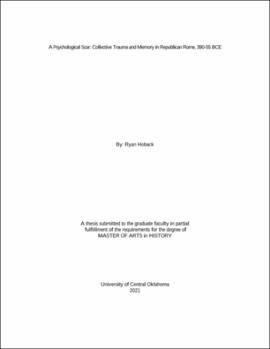| dc.contributor.advisor | Magnusson, Andrew David | |
| dc.contributor.author | Hoback, Ryan | |
| dc.date.accessioned | 2022-02-18T15:51:41Z | |
| dc.date.available | 2022-02-18T15:51:41Z | |
| dc.date.issued | 2021 | |
| dc.identifier.other | (AlmaMMSId)9982824393402196 | |
| dc.identifier.uri | https://hdl.handle.net/11244/334643 | |
| dc.description.abstract | The sack of Rome by the Gallic chieftain Brennus in 390 BCE was the cause of a collective trauma that influenced all sectors of Roman society. The collective trauma and memory were, in part, responsible for policy changes, religious and ceremonial practices, and military campaigns. Additionally, the trauma influenced the Senate in political matters, such as Gaius Marius' five consecutive consulships (104-100 BCE) and Julius Caesar's ten-year proconsulship of Cisalpine and Transalpine Gaul (58-48 BCE). Each chapter demonstrates how the memory or trauma manifested itself in Roman history. The introduction provides a synopsis of each individual chapter as well as a brief overview of various examples which support the notion that the collective trauma was present. The ways in which historians have perceived and understood La T�ne Gauls are explored throughout the historiography in Chapter Two, as well as the influences outside the field of Gallic history that altered the study of La T�ne Gaul. Chapter Three explores the sack of Rome in 390 BCE and the aftermath, including the formation of the trauma and the ways in which it influenced Roman society. Chapter Four seeks to understand the relationship between collective trauma, memory, and the three cases of human sacrifice (228, 216, and 114-113). Lastly, Chapter Five introduces the idea of the Just War and the way in which Caesar violated such a tradition. Additionally, it explores why the Senate willingly accepted Caesar's actions despite the genocidal nature of his war in Gaul. Several primary sources are referenced, including Livy's Ab Urbe Condita (From the Founding of the City), Plutarch's Lives, and Caesar's Commentarii de Bello Gallico (Commentaries on the Gallic War). The Gauls quickly became "the Other" and were the focus of Rome's vengeance many generations after the sack. If we can understand how humans behave in the aftermath of a traumatic event, we can better prepare for and respond to the traumatic events of our contemporary world. | en_US |
| dc.rights | All rights reserved by the author, who has granted UCO Chambers Library the non-exclusive right to share this material in its online repositories. Contact UCO Chambers Library's Digital Initiatives Working Group at diwg@uco.edu for the permission policy on the use, reproduction or distribution of this material. | |
| dc.subject.lcsh | Collective memory | |
| dc.subject.lcsh | Rome | |
| dc.subject.lcsh | History | |
| dc.subject.lcsh | Psychic trauma | |
| dc.subject.lcsh | Allia, Battle of the, Italy, 390 B.C. | |
| dc.subject.lcsh | Influence | |
| dc.subject.lcsh | La Tène period | |
| dc.title | A psychological scar: collective trauma and memory in republican Rome, 390-55 BCE | en_US |
| dc.type | Academic theses | |
| dc.contributor.committeeMember | Musgrove, Margaret Worsham, 1962- | |
| dc.contributor.committeeMember | Lacher, Katrina | |
| dc.thesis.degree | M.A., History | |
| dc.subject.keywords | Collective trauma | |
| dc.subject.keywords | Gaul | |
| dc.subject.keywords | Memory | |
| dc.subject.keywords | Republic | |
| dc.subject.keywords | Rome | |
| dc.subject.keywords | Trauma | |
| dc.identifier.oclc | (OCoLC)1309300395 | |
| thesis.degree.grantor | Jackson College of Graduate Studies | |
